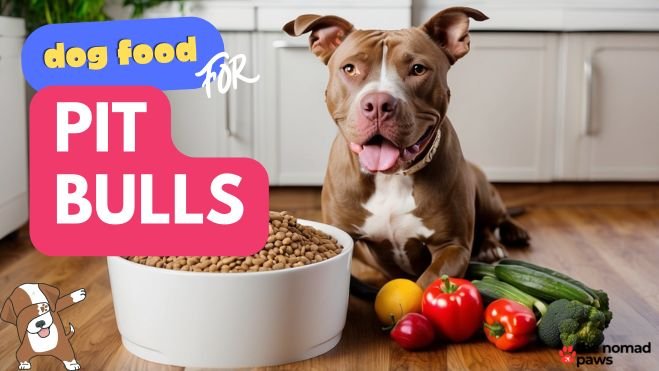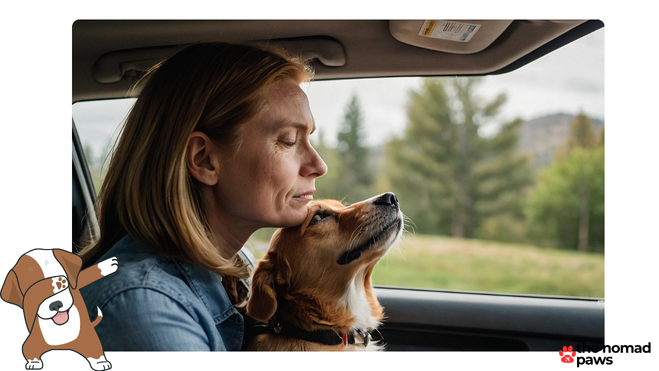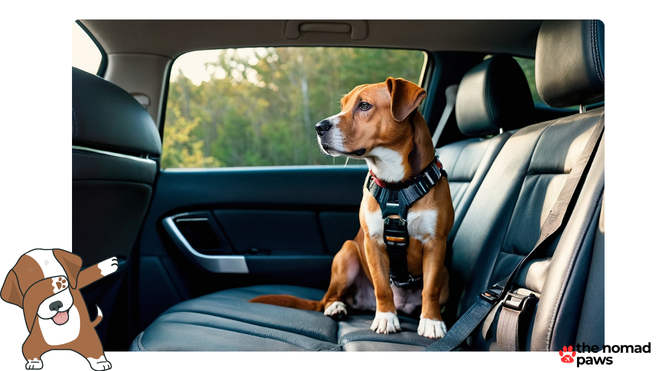To keep your pit bull healthy and thriving, you’ll need a dog food that meets their unique nutritional requirements.
As a puppy, a pit bull need at least 22% protein, while adults require a minimum of 18% protein. Keeping this in mind, you need to look for foods with high-quality protein sources like chicken, beef, or lamb, and moderate fat levels around 12-18%.
Complex carbohydrates like whole grains and vegetables should make up 30-50% of the diet.
Our top picks for pit bulls include wet dog food like Ollie Fresh and dry pet food like the Natural Balance Limited Ingredient or the Diamond Premium Recipe for Puppies.
Continue reading to find al lot more than ‘just’ the best dog food for pit bulls.
To bring you this guide, I’ve worked with seven different canine nutritionists who have shared with me some great tips on pit bull nutrition and diet.
Understanding Pit Bull Nutritional Needs
Before we get on the actual products that best reflect the needs of an American pitbull terrier, let’s discuss some key aspect of this breed’s nutritional neeeds.
While knowing what’s the best dog food is obviously important, knowing how to understand the uniqueness of a pitbull’s diet will help you to choose from our suggestions below.
In short, you’ll want to focus on three key areas:
- Protein requirements to support their muscular build
- The right balance of fats and carbohydrates to fuel their energetic lifestyle
- The essential vitamins and minerals that keep them healthy and thriving
Protein Requirements

Pit bulls’ muscular build and active lifestyle demand a diet rich in protein to support their unique nutritional needs.
As a pit bull owner, you’ll want to guarantee your furry friend is getting enough protein to build and maintain strong muscles, healthy skin, and a shiny coat.
Pit bulls require a minimum of 22% protein in their diet during puppy and lactating stages, and at least 18% protein for adult maintenance.
To meet these needs, look for dog food formulas with named meat proteins like chicken, beef, or lamb as the primary ingredients.
These protein sources provide essential vitamins and minerals, such as iron, zinc, and B vitamins, that support overall health and well-being.
When choosing your dog’s food, select a formula that’s high in protein from animal sources, as these are more easily absorbed by your pit bull’s body.
A balanced diet with the right amount of protein will help your pit bull thrive and maintain their energetic and playful personality.
Fat and Carbohydrate Balance
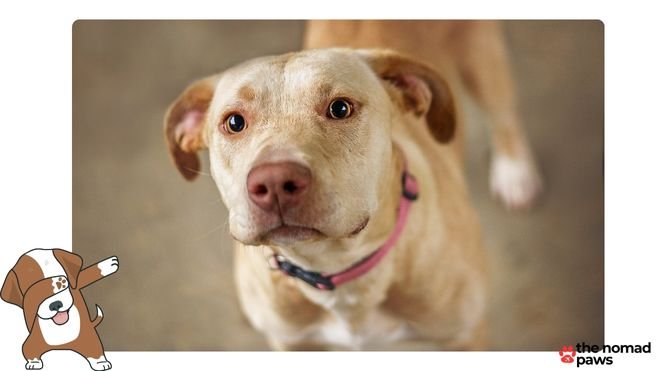
While protein is a key component of your pit bull’s diet, you also need to strike the right balance of fat and carbohydrates to support their high energy needs and maintain a healthy weight.
Aiming for moderate fat levels, around 12-18%, will provide your pit bull with the energy they need without promoting excessive weight gain.
Complex carbohydrates, such as whole grains and vegetables, should make up 30-50% of their diet, supplying fiber and essential nutrients.
Essential Vitamins and Minerals
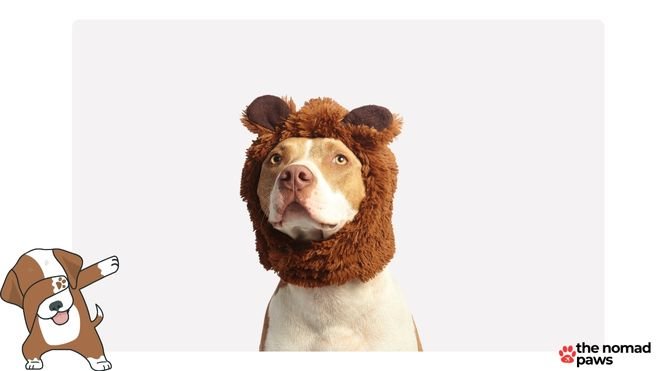
How can you guarantee your pit bull gets the essential vitamins and minerals they need to sustain a healthy, active lifestyle? It starts with choosing a dog food that’s rich in high-quality protein, which provides the building blocks for their muscular build.
But that’s not all – you also want a formula that’s packed with omega fatty acids, particularly omega-3 and omega-6, which support healthy skin, coat, joints, and brain function.
In addition to these essential fatty acids, look for a food that’s fortified with vitamin E, a powerful antioxidant that helps boost your pit bull’s immune system and protect against oxidative stress.
Like we’ve seen in our guide to the best food for Great Danes, glucosamine is another key ingredient to support joint health and mobility, which is especially important for pit bulls that are prone to joint issues.
Best Dog Foods for Pit Bulls: Our Top Picks
Now that you know the basics of the nutritional needs of your American pit bull terrier, it’s time to explore the best dog foods that cater to those requirements.
Like we’ve just seen, you’ll want to look for formulas that are high in protein, rich in healthy fats, and packed with essential vitamins and minerals – and that’s exactly what our top picks offer.
From grain-free recipes to limited-ingredient diets, we’ve an extensive selection of top-rated dog foods, including Taste of the Wild, Crave, The Farmer’s Dog, Ollie Fresh Dog Food, and Natural Balance Limited Ingredient.
Taste of the Wild High Prairie Canine Grain-Free Recipe with Roasted Bison and Venison
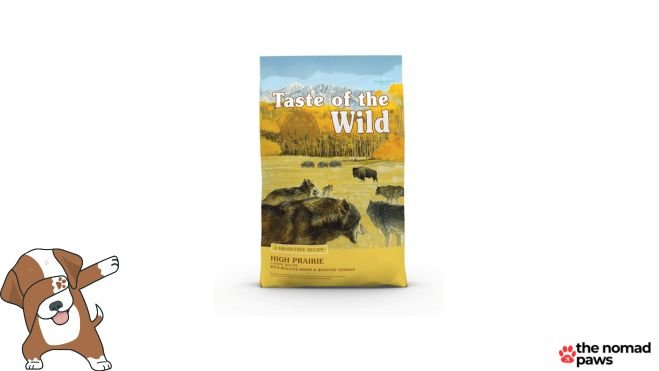
Taste of the Wild’s High Prairie Canine Grain-Free Recipe with roasted bison and venison stands out as a very good option for pit bulls, thanks to its unique blend of protein-rich ingredients and nutrient-dense vegetables.
This high-protein dog food is specifically designed to meet the nutritional needs of adult dogs, making it an excellent choice for your pitbull. With 32% of the recipe being protein, you can trust that your dog is getting the energy they need to stay active and healthy.
- Unique Protein Sources: This recipe combines roasted bison and roasted venison for a unique taste that your pitbull will love.
- Nutrient-Dense Vegetables: Vegetables, legumes, and fruits provide powerful antioxidants to support your dog’s overall health.
- Grain-Free Formula: This grain-free recipe is designed to be easily digestible, reducing the risk of digestive issues in your pitbull. This is particularly indicated if you are looking for the best dog food for dogs with sensitive stomachs.
Crave Grain Free High Protein Adult Dry Dog Food
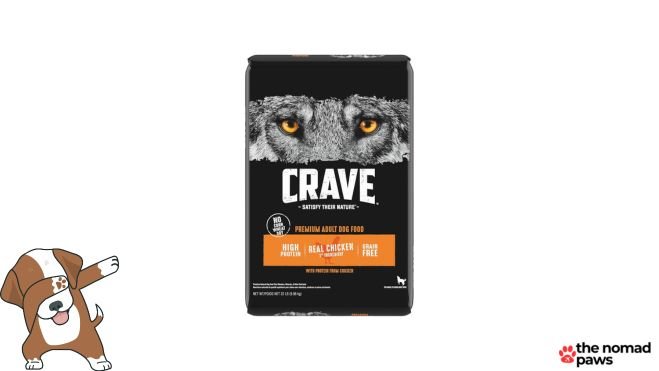
You’re looking for quality food for your pit bull, and Crave Grain Free High Protein Adult is definitely worth considering.
Often considered to be the best dog foods for pitbulls, Crave Grain Free High Protein delivers 34% high protein to support a strong, lean body.
This grain-free dog dry food is made with real chicken as the first ingredient, providing your adult pit bull with the nutrients they need to thrive.
As a grain-free dog food, Crave eliminates common allergens like corn, wheat, and soy, reducing the risk of digestive issues. Instead, it uses carbohydrate sources like peas for energy.
The formula is also free from artificial flavors, colors, and preservatives, all substances that it’s always best to avoid to ensure your pit bull only gets the good stuff.
With its high protein content and wholesome ingredients, Crave Grain Free High Protein is an excellent choice for American pit bull terriers owners who want the best for their furry friends.
The Farmer’s Dog
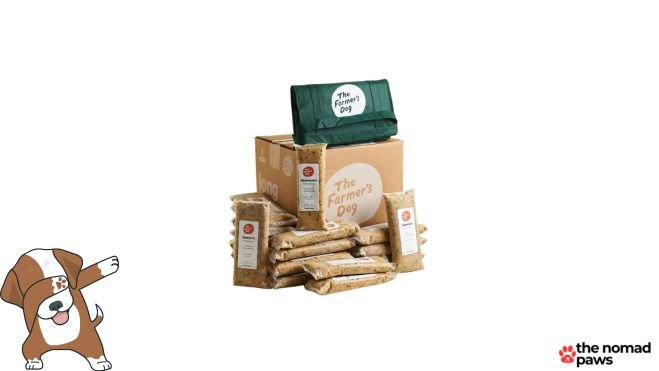
For pit bull owners seeking a more tailored approach to their dog’s nutrition, The Farmer’s Dog offers a unique solution with its human-grade, vet-developed meals that cater to individual needs.
Their meals are made with real meat, carefully selected to guarantee your pit bull gets the protein they need to be at their best. With The Farmer’s Dog, you can trust that your dog is getting only the best, as their meals are made fresh and quickly frozen to lock in nutrients.
This type of dog foods offers vet-developed plans designed by specialists to ensure your dog gets the nutrients they need to stay healthy and active.
All the meals provided by Farmer’s Dog are made fresh and quickly frozen to preserve nutrients. This is amazing to guarantee that your dog gets the best possible nutrition.
To make things even more interesting, The Farmer’s Dog offers customized meal plans tailored to your dog’s specific needs. This way you know they get the right amount of protein, fat, and other essential nutrients.
While many pit bulls do not need a tailor-made diet, this option is great in case of allergies to different ingredients.
Ollie Fresh Dog Food

With its high-quality protein sources and whole food ingredients, Ollie Fresh Dog Food is a top contender for pit bull owners seeking a nutrient-rich diet that meets their dog’s unique needs.
When you choose Ollie, you’re giving your pit bull a recipe that’s carefully crafted with ingredients like turkey, kale, lentils, carrots, and turkey liver.
These ingredients provide a boost of protein, fiber, and essential vitamins and minerals that support your dog’s overall health and well-being.
You’ll appreciate that Ollie’s recipe is designed to meet the specific needs of active breeds like pit bulls. The turkey and turkey liver offer a concentrated source of protein, while the kale and carrots provide a rich source of antioxidants and fiber.
Natural Balance Limited Ingredient
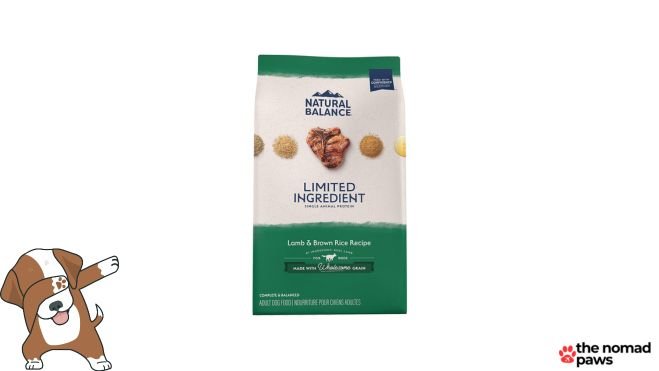
Choosing a limited-ingredient diet like Natural Balance’s Beef & Brown Rice Formula can help simplify your pit bull’s nutrition while still providing the essential vitamins, minerals, and protein needed to support their overall health and well-being.
With hearty beef as the first and single animal protein, this food is designed to meet the unique nutritional needs of your dog.
By using only one protein source (beef), this food reduces the risk of food sensitivities and allergies. Also, the whole-grain brown rice provides fiber and nutrients for digestive health and satisfaction.
Diamond Premium Recipe for Pit Bull Puppies
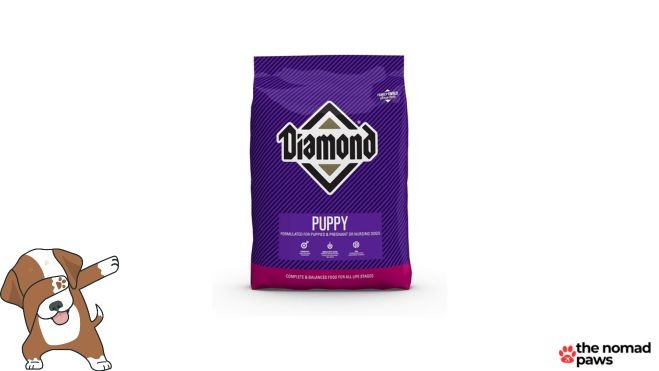
When it comes to feeding pitbull puppies, Diamond Premium Recipe for Puppies is an excellent option that provides a well-balanced and nutritious diet specifically designed for growth and development.
This formula is suitable for puppies and pregnant or nursing adult dogs, guaranteeing that your pit bull puppy gets the best possible start in life.
With DHA for proper brain and vision development, balanced fat, protein, and essential nutrients, this recipe supports the unique needs of your puppy.
Diamond Premium Recipe for Puppies includes guaranteed probiotics, antioxidants, and omega fatty acids to support digestive and immune systems, overall well-being, and healthy skin and coat.
This recipe is also formulated to meet the Association of American Feed Control Officials (AAFCO) nutritional levels for all life stages, giving you peace of mind that your puppy is getting the nutrients they need.
Royal Canin Large Aging 8+ Senior Dry Dog Food
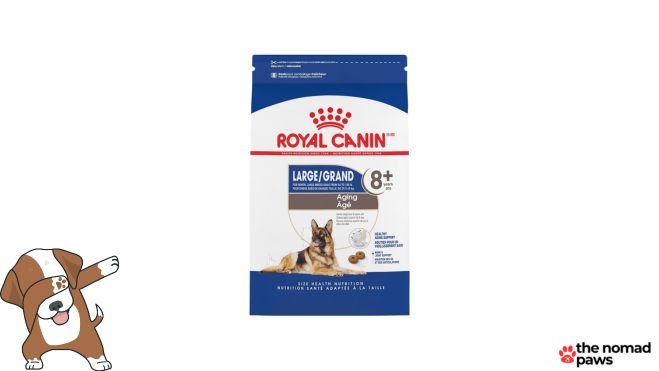
Royal Canin Large Aging 8+ Senior dry dog food is specifically designed for ageing pit bulls, making it an ideal choice for owners seeking a nutritionally complete and balanced formula to support their large breed dog’s unique needs in its later years.
As your Pit Bull ages, its digestive health, bone and joint support, and overall significance become increasingly important.
This food promotes digestive health through highly digestible proteins and a balanced supply of fibers. It also supports healthy bones and joints with a combination of minerals and nutrients.
This is the best food for pit bulls in their senior years. It encourages chewing and helps maintain vitality in ageing large dogs. With its adapted kibble size and shape, it supports your dog’s distinct needs and promotes a shiny coat and healthy skin.
How Much Should a Pit Bull Eat?
When it comes to feeding your pit bull, you need to learn to adjust their diet based on their specific life stage.
Pit bull puppies have high energy levels and grow quickly, so they need a nutrient-rich diet designed to meet their unique needs.
As a breed that thrives on protein, pit bull puppies require a diet that is rich in animal-based protein to support muscle growth and development.
When choosing puppy food for your pit bull, look for formulas that cater to their specific nutritional requirements, including:
- High-quality sources of protein: Make sure that chicken, beef, or fish are listed as the first ingredients to support muscle growth and development.
- Controlled levels of calcium and phosphorus: Large breed pit bull puppies need precise amounts of these minerals to prevent skeletal issues like hip and elbow dysplasia.
- Omega-rich ingredients: Omega-3 and omega-6 fatty acids from sources like fish oil or flaxseed promote healthy skin, coat, and brain development.
A well-balanced puppy food should also contain essential vitamins, minerals, and antioxidants to support overall health and immune function.
When you work on your dog’s diet, consider a formula that promotes bone and joint health to ensure that your pit bull puppy enjoys a lifetime of mobility and comfort.
Transitioning your pit bull to an adult diet around 18-24 months of age allows you to customize their nutrient intake to their life stage, promoting optimal health, energy, and mobility throughout adulthood.
As a large breed, pit bulls need a diet that is high in quality protein to maintain their muscular build. Look for a natural diet with a protein content of at least 25-30% from sources like chicken, fish, or beef.
Taste of the Wild’s adult formulas are a great choice as they provide a balanced mix of protein, healthy fats, and complex carbohydrates.
In addition to protein, your pit bull’s adult diet should include essential vitamins, minerals, and antioxidants to support overall health and immune function. Omega-3 and omega-6 fatty acids are also important for maintaining healthy skin and coat, as well as supporting joint function.
As your pit bull enters their senior years, you will need to adjust their diet to meet their changing nutritional needs. At this stage, their energy levels decrease, and their joints may become stiffer.
- Joint Health: Look for a senior dog food that contains glucosamine, chondroitin, and omega-3 fatty acids to support joint health and mobility.
- Immune System: Include antioxidants and probiotics in their diet to boost their immune system and prevent illnesses.
- Protein and Fat: Choose a formula with lower protein and phosphorus content to avoid putting strain on their kidneys and liver.
When selecting a senior dog food, opt for a formula that is lower in calories and contains higher-quality protein sources.
Dental health is also important, so choose softer kibble or canned food that is easier to chew and digest.
Addressing Common Pit Bull Health Issues Through Diet
Choosing the right diet for your dog can make a big difference in preventing common health issues and ensuring a good quality of life for your furry friend.
To keep your pit bull healthy and thriving, you need to choose a dog food that supports joint health, skin and coat care, and weight management. By doing so, you can help your pit bull stay active, pain-free, and at a healthy weight.
Let’s take a closer look at how the right dog food can address these specific areas.
Joint Health and Mobility

A balanced diet is probably the most important step you can take for maintaining your pit bull’s joint health and mobility. This will help prevent common joint problems and ensure that your pit bull can move around comfortably.
That’s why the best dog food brands promote products that contain substances like glucosamine and chondroitin, which support healthy joints and cartilage.
Additionally, omega-3 and omega-6 fatty acids can help reduce inflammation and alleviate joint pain.
Skin and Coat Care
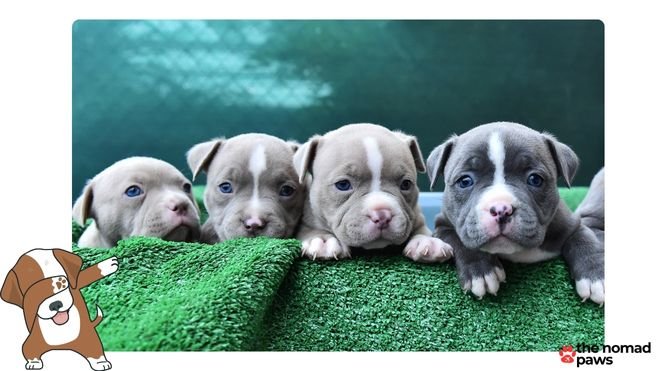
To keep your pit bull’s skin and coat healthy, choose a diet that is rich in nutrients. Fish oil is a key ingredient to look for, as it is packed with omega-3 and omega-6 fatty acids that reduce inflammation and promote a shiny coat.
High-quality protein sources, such as lean meats and fish, are also important for maintaining healthy skin and a vibrant coat.
Antioxidants found in fruits and vegetables can further enhance the condition of your pit bull’s skin and coat.
When selecting a dog food, be mindful of common allergens and fillers that can cause irritation and dryness. Opt for a well-balanced diet that is free from allergens and rich in nutrients to ensure a healthy coat for your pit bull.
Weight Management
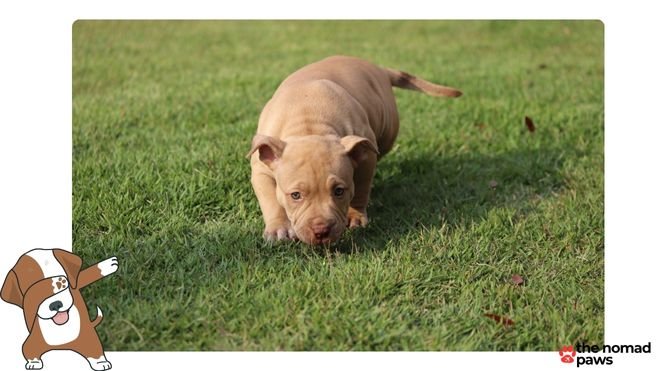
Maintaining a healthy weight is crucial for pit bulls to avoid obesity-related health issues.
A balanced diet plays a significant role in managing their weight and promoting lean muscle mass.
Be mindful of treats and table scraps, as overfeeding can lead to obesity. Limit these extras to ensure your pit bull maintains a healthy weight.
Focus on a high-protein, moderate-fat, and low-carbohydrate diet for your pit bull. This will support weight management and help build strong muscles.
Include protein-rich foods like chicken, fish, or beef in their diet, and add fiber-rich vegetables like green beans, carrots, and sweet potatoes to promote healthy digestion and prevent weight gain.
How to Transition Your Pit Bull to a New Diet
When you’re getting ready to switch your pit bull to a new diet, it’s super important to do it gradually. This helps prevent tummy troubles and makes the transition as smooth as possible.
Sudden changes in dog food can upset their digestion, so take your time and make the switch over 7-10 days.
To make the change easier, mix more and more of the new food in with less of the old food. This gives your pit bull’s tummy a chance to get used to the new stuff.
Example: Start by adding 25% of the new food to 75% of the old food, then gradually increase the new food until it’s 100%.
While you’re transitioning your pit bull to the new diet, keep a close eye on their digestion.
Watch out for any signs of tummy troubles like vomiting, diarrhea, or loss of appetite. If you notice any of these symptoms, slow down the switch or ask your vet for advice.
Homemade and DIY Food Options for Pit Bulls
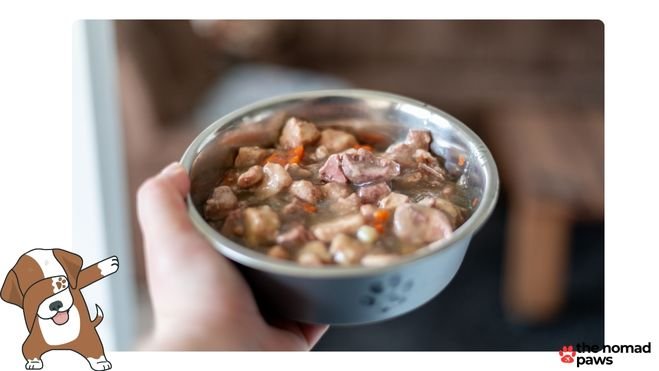
Now that you have a good grasp of your pit bull’s nutritional needs, it’s time to discuss homemade and DIY food options.
Please, note that while many dog owners love the idea of getting full controll over what their furry friends eat and swear by the raw food diet – I am strongly against it.
Why am I against it?
While the raw food diet is popular among some dog owners, it is not without risks.
This option should only be considered under the strict supervision of a veterinary nutritionist or specialist.
Improperly balanced raw diets can lead to serious health issues in your dog, including nutritional deficiencies and infections.
Recipes and Meal Plans
When considering homemade or DIY food options for your pit bull, you will need to create a balanced recipe that includes high-quality protein sources, essential fatty acids, and suitable carbohydrates to meet their specific nutritional needs
A natural adult pit bull’s diet should be protein-rich, moderately fatty, and contain limited carbohydrates to maintain their muscular build and active lifestyle.
- Raw Diet Delight: Mix 1 pound of raw ground beef, 1/2 cup of cooked sweet potatoes, and 1/4 cup of mixed vegetables for a meal packed with nutrients.
- High-Protein Stew: Combine 1 pound of cooked chicken breast, 1/2 cup of cooked brown rice, and 1/4 cup of steamed green beans for a hearty and satisfying meal.
- Pit Bull Power Bowl: Blend 1 pound of cooked salmon, 1/2 cup of cooked quinoa, and 1/4 cup of roasted carrots for a balanced and delicious meal.
Remember to consult with a veterinarian before making any changes to your pit bull’s diet, especially if you’re considering a raw diet or homemade meal plan.
Supplements and Dog Food Toppers
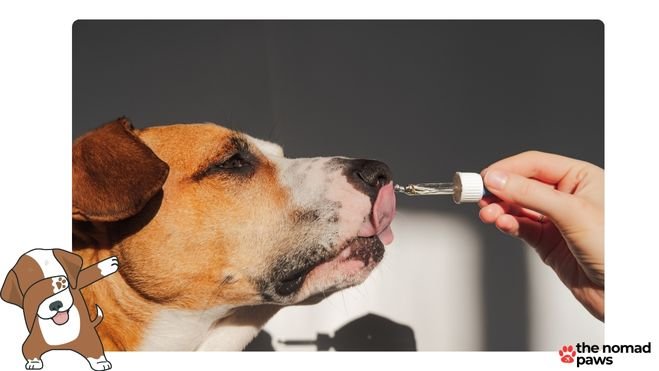
To take your pit bull’s homemade or DIY diet to the next level, consider adding supplements and extras that provide essential nutrients and health benefits.
Adding fish oil is a great way to start, as it provides omega-3 fatty acids that support skin, coat, joint, brain, and immune health.
You can also mix in cooked vegetables like carrots, green beans, and sweet potatoes, which provide beneficial fiber, vitamins, and minerals.
Homemade meals can be tailored to meet your pit bull’s specialized dietary needs, using high-quality lean proteins, complex carbohydrates, and healthy fats.
Another nutritious add-in is bone broth or kefir, which can boost hydration and provide probiotics for digestive support.
For joint health and reduced inflammation, consider incorporating natural supplements like glucosamine or turmeric. These supplements can make a big difference in your pit bull’s overall health and well-being.
What Vets Recommend for Pit Bulls
Vets have some great advice on what to feed your pit bull for optimal health. They suggest a diet that is high in protein and high in quality to support their strong muscles and active lifestyle.
When picking out the perfect dog food for your pit bull, keep these expert tips in mind:
- Protein power: Pit bulls need lots of protein to keep their muscles strong. Look for dog food that has chicken, salmon, or beef listed as the first ingredient.
- Joint care: Pit bulls are more prone to joint issues than many other dogs, so it’s a good idea to choose a dog food that contains glucosamine, chondroitin, and omega-3 fatty acids to support their joints.
- Healthy skin and coat: Pit bulls can be sensitive to skin allergies, so it’s important to choose a dog food that is free from grains or other common allergens.
How to Read Dog Food Labels as a Pit Bull Owner
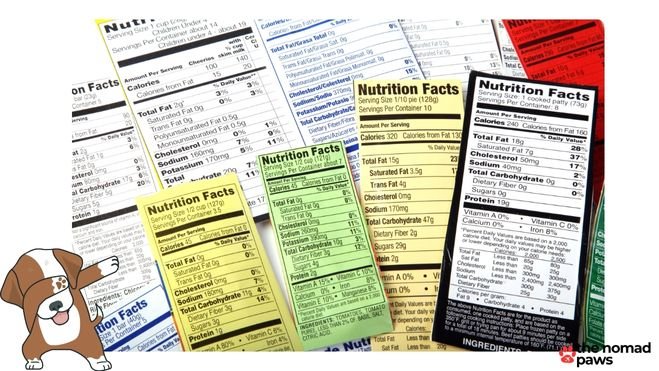
When you’re looking for the best dog food for your pit bull, you need to become an expert at reading labels.
Pay close attention to the ingredient analysis and nutritional adequacy statements on the packaging to make sure the food meets your pit bull’s specific needs.
Ingredient Analysis
When reading dog food labels for your pit bull, prioritize whole meat as the first ingredient. This provides a concentrated source of protein to support their muscular build. You want to give them the best ingredients to fuel their active lifestyle.
Choose foods that list chicken, beef, or fish as the first ingredient. This guarantees a high-quality protein source.
Look for foods with a balanced fat-to-protein ratio. Pit bulls benefit from a diet higher in fats to support their energy needs.
Consider foods with fewer ingredients. This can help minimize the risk of allergies and sensitivities that are common in pit bulls.
Also, make sure the food contains essential vitamins and minerals, such as omega fatty acids, to promote healthy skin, coat, joints, and overall well-being.
Nutritional Adequacy Statements
To ensure that your pit bull is getting a nutritionally complete diet, it’s important to understand the nutritional adequacy statement on the dog food label.
This statement indicates whether the food meets your dog’s specific life stage needs and provides the necessary protein and amino acids, vitamins, and minerals for their overall health.
You’ll usually find this statement on the label or packaging of the dog food. It may say something like ‘complete and balanced for adult maintenance’ or ‘nutritionally adequate for growth and development.’
When choosing a dog food, make sure to select a formula that suits your pit bull’s life stage and lifestyle.
For example, if your pit bull is an adult, choose a food that is formulated for adult maintenance. If your pit bull is a puppy, go for a food that is designed for growth and development.
Feeding Schedule and Portion Control for Pit Bulls

Taking care of your pit bull’s feeding schedule and portion control is super important to keep them healthy. It all starts with establishing a routine that meets their unique needs at each stage of life.
Since pit bulls are a larger breed, they need a specific feeding schedule to support their growth and development, especially when they’re puppies.
It’s best to feed your pit bull puppy 3-4 small meals a day to keep up with their high energy demands and to help them grow quickly.
Talk to your vet to figure out the best feeding schedule and portion sizes for your pit bull. They’ll take into account your pit bull’s age, weight, and activity level.
Puppies need to be fed more often than adult pit bulls, and adult pit bulls need a balanced diet to maintain their weight and overall health.
If your pit bull is really active, they might need more food to keep up with their energy needs. On the other hand, if they’re not very active, they might need less food to avoid gaining weight.
Myths and Facts About Pit Bull Nutrition
There are a lot of common misconceptions about what they should eat, so it’s important to know what’s true and what’s not. That way, you can give your pit bull terrier the best diet possible.
| Myth | Fact |
|---|---|
| Pit bulls require a specialized ‘pit bull’ dog food. | Pit bulls have similar nutritional needs to other medium to large breed dogs and do not require a special breed-specific diet. |
| Pit bulls need a high-protein diet. | The nutritional needs of pit bulls are similar to other dogs, with protein requirements ranging from 18-30% depending on age, activity level, and life stage. |
| Pit bulls should only be fed raw diets. | Pit bulls can thrive on a variety of high-quality commercial dog food formulas, both wet and dry, as well as home-cooked or raw diets when properly balanced. |
| Pit bulls are prone to obesity and require a low-calorie diet. | Pit bulls have normal caloric needs compared to other dogs and simply require appropriate portion sizes and activity levels to maintain a healthy weight. |
| Pit bulls have unique nutritional deficiencies. | Pit bulls have the same essential vitamin, mineral, and nutrient requirements as other dog breeds and do not have any known breed-specific deficiencies. |
Frequently Asked Questions about Pit Bull Nutrition
Look for high-protein, nutrient-dense foods that support their muscular build and active lifestyle, and consider grain-free or limited-ingredient options if they have food allergies or sensitivities.
It can be, but you’ll need to choose a formula that meets their nutritional requirements, such as high-quality protein and healthy fats, and avoid fillers and by-products.
Common allergens include beef, dairy, chicken, and soy, as well as grains like wheat, corn, and rice. These could trigger skin issues and digestive problems.
You’ll want to steer clear of foods like chocolate, onions, garlic, xylitol, grapes, and raisins, which can be toxic to your pit bull. Cooked bones are also off-limits, as they can cause digestive obstructions or punctures.

